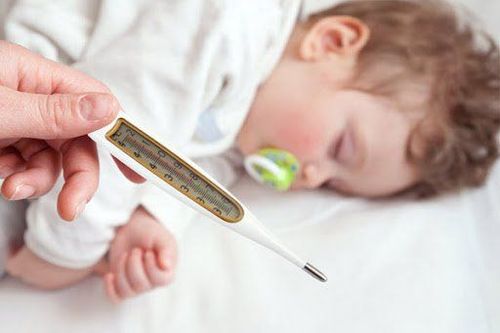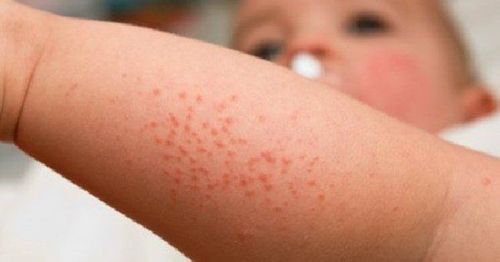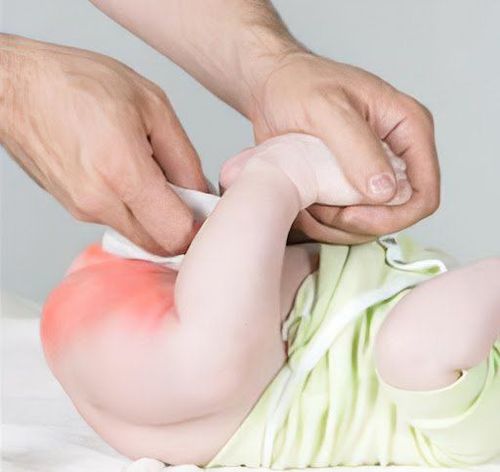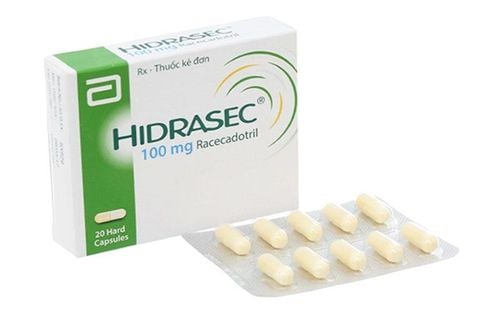This is an automatically translated article.
Knowledge about health problems in children is necessary in the process of raising children to develop comprehensively. Therefore, parents need to early recognize common problems and diseases in children for timely care and treatment.
1. Diarrhea trait
Infections, difficulty digesting certain foods or drinking too much juice or milk are among the common causes of diarrhea in children. If your child has frequent loose stools, keep him or her at home and stay hydrated. If your child already knows how to eat solid foods, avoid giving them foods that are high in fiber and fat.
Call the doctor if your child is not getting better after 24 hours, is younger than 6 months old, or has other symptoms such as a high fever that is difficult to bring down, vomiting, urinating less than usual, fast heartbeat, bloody stools, or abdominal pain, crying a lot.
2. Fever is a common problem in children
Fever is a common symptom in common childhood illnesses. Parents should call the doctor immediately if:
Baby under 3 months has a rectal temperature of 38oC or higher; Babies aged 3 to 6 months with a temperature of 38.3oC or higher; Or if the infant is fussy, irritable, and uncooperative. Watch for other health problems in your child such as earache, cough, lethargy, rash, vomiting or diarrhea. Initially, it is necessary to reduce the child's fever by cooling off, taking a warm bath and wearing light clothes. Ask your doctor about safe ways to effectively reduce your child's fever. A fever with spots or purpura on the skin (2 conditions defined by colored spots or rashes on the skin caused by leaky blood vessels) is a serious emergency that you should contact your doctor. .

Sốt là triệu chứng phổ biến trong các bệnh thường gặp ở trẻ
3. Constipation in children
Some children have bowel movements several times a day, others take a few days to have a bowel movement. Constipation is when a child passes hard and painful stools. Your doctor may suggest that you give your child extra fluids or add a little prune juice to your baby's bottle or drinking cup to make bowel movements easier. However, if your child is constipated with other symptoms, such as abdominal pain or vomiting, this is a health problem that should be seen by a pediatrician.
4. Rashes in Children
Skin rashes in children can range from pimples to small white bumps or red, dry and itchy patches (eczema). To prevent diaper rash, change diapers often and apply a protective ointment to the skin. For eczema, it's important to avoid harsh soaps and keep your baby's skin moist. Most rashes are not very serious. But call your doctor if the skin damage is painful or severe, and your child has a fever, blisters, or pus on the skin.
5. Cough in children
Listen to the sound of coughing in young children. If the cough is accompanied by wheezing, the child may have croup. A cough with a low-grade fever may occur if the child has a cold. A higher persistent fever could mean pneumonia or the flu. Children who cough and wheeze at the same time are likely to have bronchiolitis, asthma, or pneumonia. Children with whooping cough have coughing fits and make a "cough" sound.
Besides the specific treatment prescribed by the doctor, using a cool mist humidifier and rehydrating the child can ease the symptoms. Care should be taken not to give home cough or cold medicines to infants or children under 4 years of age without consulting a specialist.
6. Abdominal pain
When your baby is bloated, he may cry a lot, arch his back, and vomit. This condition can be caused by colic, gastroesophageal reflux disease, indigestion of certain foods, infection or other reasons. Sometimes children get sick if they explore different foods at the same time. Most abdominal pain is harmless and goes away on its own. However, call the doctor if the condition does not improve, or your child has vomiting, diarrhea, coma, or fever.

Cần theo dõi các vấn đề sức khỏe ở trẻ khác như đau tai, ho, hôn mê, phát ban
7. Pain when teething
At about 6 months of age, the tiny baby teeth will begin to poke through the baby's gums. That often makes babies cry a lot! A quick response is to give your child something safe to chew on. BPA-free rubber teething rings are always the best choice. You can also use your fingers to gently massage the surface of the gums or have your child chew on something cool, such as a chilled wet washcloth. You can also ask your doctor if a pain reliever like Acetaminophen is okay for a teething baby.
8. Bloating is a health problem in children
Bloating during the first 6 months is a pretty normal baby health problem! To help prevent colic, feed your baby milk slowly and gently burp frequently. Give your baby a break to burp during the feeding and afterwards too. If you're using formula, try not to shake it a lot (to avoid foaming) as babies who swallow air bubbles will quickly become bloated.
9. Nasal congestion is a common disease in children Nasal congestion is a health problem that always makes children very uncomfortable. This is a symptom of common diseases in children on the respiratory tract. At this time, do not arbitrarily use over-the-counter cold medicine for children under 4 years old. Instead, put physiological saline into the child's nose to thin the mucus, then suck it out of the nose with a syringe or a nasal aspirator. A nebulizer in the bedroom can help your baby breathe easier at night.
10. Nausea and vomiting This is very common and mostly harmless. However, call your doctor if your child's vomiting doesn't stop for several hours, or if your child also has a fever with vomiting and is refusing to eat.
11. How to stay calm while taking care of a sick child? When health problems in children occur, parents will be very confused and feel bad. However, try to stay calm and trust your parenting instincts. Watch for signs that your child needs a doctor or urgent medical attention. Some of the warning signs of common illnesses in babies are a change in appetite, extreme fussiness, lethargy, trouble breathing, rash - especially a rash that spreads quickly on the skin, stiff neck, seizures , high fever and little urination.
In short, raising children is an exciting experience, a journey that requires a lot of knowledge and experience of parents. If equipped with the knowledge about common diseases in children as above, parents will be confident to quickly recognize health problems in their children, from which they will have the right treatment when their children are sick.
With many years of experience in examining and treating diseases in children, now the Pediatrics Department at Vinmec International General Hospital has become one of the major health care centers, capable of examining , screening and treatment of many specialized diseases in children. Therefore, if the child is sick or has long-term health problems that do not go away, shows signs of infection, parents can take the child to Vinmec International General Hospital for examination and support. Support and advice from doctors.
Please dial HOTLINE for more information or register for an appointment HERE. Download MyVinmec app to make appointments faster and to manage your bookings easily.
Reference source: webmd.com












